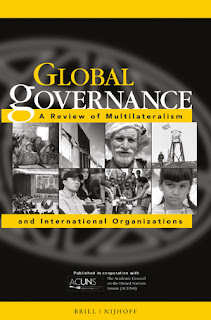As the United Nations celebrates its 75th anniversary this year, it becomes pertinent to assess the performance of the UN Secretariat so far. BOB REINALDA takes on the question in a research article in the journal Global Governance: A Review of Multilateralism and International Organizations.
“The institutional development of the secretariat of an international organization (IO) depends on the leadership displayed by the executive head and senior staff and on the political settings such as the constitutional leeway, the selection of its main functionaries, the conditions set for activities, and the allocation of resources,” he writes in the article, ‘Institutional Development of the United Nations Secretariat’. “The better the secretariat is managed, the stronger the leadership capacity of the organization’s executive head will be.”
However, REINALDA adds, it may be questioned whether this same expectation regarding effective management can be applied to the UN.
When states create IOs, the negotiation results are carefully recorded in the constitution. However, constitutional sections on the secretariat and staff are relatively short and lack detail, which implies that secretariats need to be elaborated by their staff who are given some room to maneuver to do so (in principal-agent theory referred to as ‘agency slack’ or ‘slippage’).
“This is also true of the UN Charter, with only 5 out of 111 Articles discussing the Secretariat and a major administrative role for the first and successive Secretaries-General.”
IO secretariats are hierarchically organized organs whose leadership sees to the organization’s continuity, seeks to devote itself to its objectives, runs the headquarters and field missions, and represents the organization vis-à-vis other actors. Secretariats encounter limitations, among them political restrictions and insufficient resources. Playing a role of its own in world politics may not be obvious for IOs, given the major powers’ inclination to curb that role, but executive heads have several assets available to act independently such as their good offices and the IO’s bully pulpit.
“Since most literature on the UN Secretariat focuses on external, or political, leadership, I examine here the internal, or administrative, leadership,” REINALDA writes.
When the UN was first established, a choice was made to have one secretariat to serve all principal organs. The Secretary-General is both a political figure, given the opportunity to bring threats to international peace and security to the attention of the Security Council, and the UN’s chief administrative officer. The December 1945 Report of the Preparatory Commission of the United Nations stipulated that the Secretary-General’s choice of higher staff and his leadership largely determine “the character and the efficiency of the Secretariat as a whole,” mentioning aspects such as team spirit, moral authority, and Member State confidence.
The Secretary-General may assume roles as a mediator and an informal adviser to governments, but also will be called on, when exercising administrative duties, to make decisions “which may justly be called political.”
REINALDA assesses the Secretariat’s institutional development, through analysis of the administrative qualities of eight former Secretaries-General, with a focus on how they strengthened the UN Secretariat and how they weakened it.
“No fewer than six out of eight former UN Secretaries-General showed poor administrative leadership of the Secretariat, particularly regarding issues that require specific competences such as staffing, finances, and team coherence,” the author states.
Trygve Lie, the first Secretary-General, carved out the Secretary-General’s administrative role, but he weakened it by his troubled staff relations and his betrayal of the Secretariat’s independent character, REINALDA states. The sequence of four weak administrators (U Thant, Kurt Waldheim, Javier Pérez de Cuéllar, and Boutros Boutros-Ghali) during a period of thirty-five years (1961–1996) considerably and continuously enfeebled the Secretariat’s institutional development, which can be attributed to their apparent lack of administrative skills and their understanding of UN finances. Ban Ki-moon’s administrative record was also weak.
“Only two Secretaries-General had obvious administrative leadership qualities and succeeded in strengthening the Secretariat: [Dag] Hammarskjöld, because he enjoyed administration, and [Kofi] Annan, who profited from knowing the organization from within,” the author notes. Unlike the others, both also mastered intraorganizational relations, particularly with the General Assembly and the Advisory Committee on Administrative and Budgetary Questions. These relations are crucial, he stresses, given the Assembly’s inclination to control the Secretariat and to approve new expenditures resulting from what happens in the world, particularly when reform efforts are being made with austerity.
This poor administrative leadership outcome fits some general patterns observed in the literature regarding IO administration, REINALDA states. Trust, confidence, expertise, knowledge, information, and persuasion are crucial skills to the constructive workings of secretariats. But IOs have a relatively poor personnel management record.
Notwithstanding the states’ potential interest in having weak executive heads, the selection process of the UN Secretary-General should from an institutional perspective value not only issues such as gender, but also administrative qualities regarding staffing, finances, and team coherence to break away from the continual process of reform.
To end the UN’s poor administrative record, particularly in a world with multilateralism under serious pressure, there should be a greater control of internal developments (Secretariat- and UN system-wide).
Reinalda, B. (2020). Institutional Development of the United Nations Secretariat, Global Governance: A Review of Multilateralism and International Organizations, 26(2), 325-339. doi: https://doi.org/10.1163/19426720-02602005






